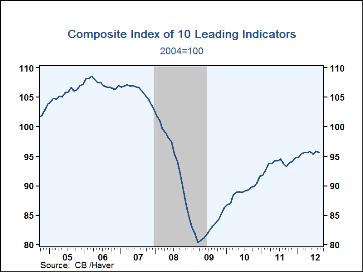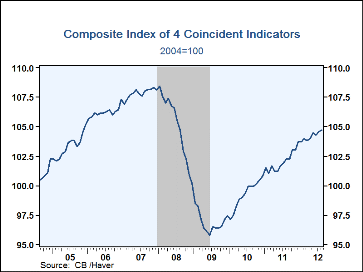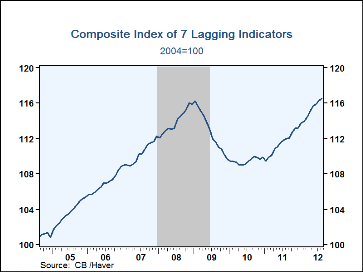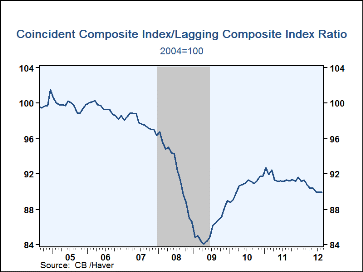 Global| Sep 20 2012
Global| Sep 20 2012U.S. Leading Indicators Slip
by:Tom Moeller
|in:Economy in Brief
Summary
The Leading Economic Indicator index from the Conference Board matched expectations and edged 0.1% lower last month. That followed a revised 0.5% July gain, initially reported as 0.4%. Sixty percent of the component series had a [...]
The Leading Economic Indicator index from the Conference Board matched expectations and edged 0.1% lower last month. That followed a revised 0.5% July gain, initially reported as 0.4%. Sixty percent of the component series had a negative influence on the index last month including a lower ISM new orders index, lower consumer expectations, a shorter work week, more initial unemployment insurance claims and fewer building permits. These declines were offset by a steeper interest rate yield spread, higher stock prices and more orders for non-defense capital goods less aircraft.
The index of coincident indicators ticked 0.1% higher following a 0.3% July gain. Gains in manufacturing and trade sales, payroll employment and real disposable income were offset by lower industrial output. The index of lagging indicators rose 0.2% following a lessened 0.3% July increase. A higher CPI for services and more C&I loans outstanding provided for the increase.
Another leading economic series is the ratio of coincident-to-lagging indicators. It measures how the economy is performing versus its excesses. The figure held steady last month but remained sharply below its high during January last year.
The Conference Board figures are available in Haver's BCI database; the components are available there, and most are also in USECON. The forecast figure for the Consensus are in the AS1REPNA database. Visit the Conference Board's site for coverage of leading indicator series from around the world.
| Business Cycle Indicators (%) | Aug | Jul | Jun | Y/Y | 2011 | 2010 | 2009 |
|---|---|---|---|---|---|---|---|
| Leading | -0.1 | 0.5 | -0.5 | 2.1 | 5.2 | 7.6 | -12.8 |
| Coincident | 0.1 | 0.3 | -0.2 | 2.4 | 2.8 | 2.5 | -7.7 |
| Lagging | 0.2 | 0.3 | 0.3 | 4.0 | 1.8 | -2.9 | -1.0 |
Tom Moeller
AuthorMore in Author Profile »Prior to joining Haver Analytics in 2000, Mr. Moeller worked as the Economist at Chancellor Capital Management from 1985 to 1999. There, he developed comprehensive economic forecasts and interpreted economic data for equity and fixed income portfolio managers. Also at Chancellor, Mr. Moeller worked as an equity analyst and was responsible for researching and rating companies in the economically sensitive automobile and housing industries for investment in Chancellor’s equity portfolio. Prior to joining Chancellor, Mr. Moeller was an Economist at Citibank from 1979 to 1984. He also analyzed pricing behavior in the metals industry for the Council on Wage and Price Stability in Washington, D.C. In 1999, Mr. Moeller received the award for most accurate forecast from the Forecasters' Club of New York. From 1990 to 1992 he was President of the New York Association for Business Economists. Mr. Moeller earned an M.B.A. in Finance from Fordham University, where he graduated in 1987. He holds a Bachelor of Arts in Economics from George Washington University.
More Economy in Brief
 Global| Feb 05 2026
Global| Feb 05 2026Charts of the Week: Balanced Policy, Resilient Data and AI Narratives
by:Andrew Cates










